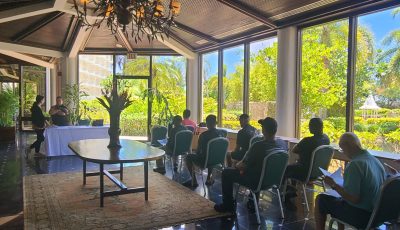Veterans bemoan healthcare access in the CNMI

Wayne Pfeffer, Veterans Affairs Pacific Islands Health Care System director, and Tracey Betts, director for the U.S. Department of Veteran Affairs’ Honolulu Regional Office hold a town hall meeting with veterans at the American Memorial Park Thursday night. (Dennis B. Chan)
“Tonight is about listening to what you have to say,” Tracey Betts, director for the U.S. Department of Veteran Affairs’ Honolulu Regional Office, told the crowd.
She explained why it was difficult for some to have their claims met. One veteran said he was fed up with being told, “We want more documents,” for pain in his eyes and ears.
Betts said in approving a claim, they ask for discharge documents, personnel records, and service treatment records, among other information, to make a decision whether one’s healthcare need is current, aggravated, or presumptive.
She said most of the time, because of lack of documents provided, claims sit in a pile called “gathering evidence.” She added, though, that the VA has gone out of its way to ask for such information and to corroborate what veterans may claim.
A veteran who identified himself as John asked the VA officials to expand the office on Saipan. He called it “so small” that you could “hear all the dirty laundry” spoken between the office’s sole doctor and patient.
One veteran asked a policy question on alternative medicine. According to him, he sent noni to his father, a veteran, who had cancer but he was told his father could be taken off his benefits if he continued with using noni.
VA Pacific Islands Health Care System director Wayne Pfeffer clarified that alternative medicine was allowed, like acupuncture, for example, but at limited access. Things like medical marijuana, though, have not been authorized at the national level.
A veteran named Joaquin described his genetic blood disorder, which requires him to have a therapeutic phlebotomy every two weeks to remove iron from his blood.
He claimed he had to wait as long as three months once to get his treatment done from the hospital here.
“To deal with CHC is the worst,” he said. “Please help us.”



























